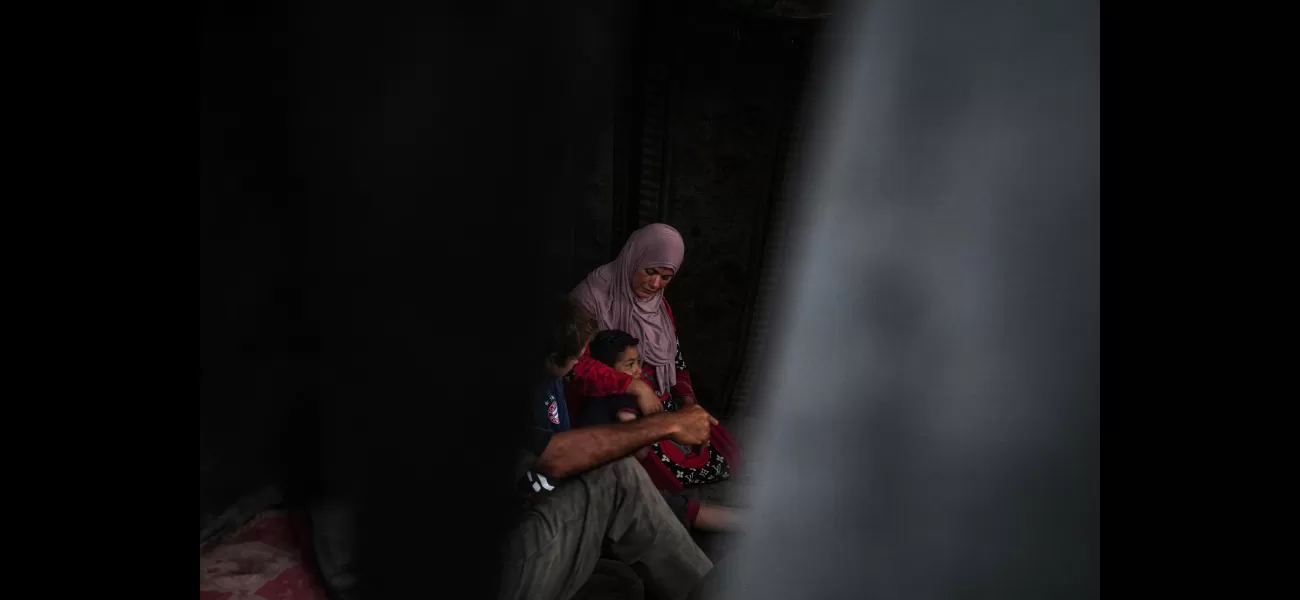Muslims in Gaza celebrate a holiday, but it is bittersweet as it reminds them of the devastating effects of war.
Last year, Gaza Palestinians joyfully celebrated Eid al-Adha, but this year, after months of war, they will be forced to eat canned food in hot tents.
June 15th 2024.

In the Gaza Strip, the summer of last year marked a joyous occasion for Palestinians. The Muslim holiday of Eid al-Adha was celebrated with all the traditional festivities - large family meals, sharing meat with the less fortunate, and new clothes and gifts for the children. However, this year's holiday paints a completely different picture. After months of devastating war between Israel and Hamas, families are left with little to celebrate. Instead of lavish feasts, many will be forced to eat canned food in sweltering tents. The local markets are lacking in meat and livestock, and the ongoing conflict has left families with no money for holiday treats or presents. It's a stark reality of war, hunger, and misery, with no signs of it ending anytime soon.
Nadia Hamouda, a mother who lost her daughter in the war, is currently staying in a tent in the town of Deir al-Balah. She expresses the sentiment of many Palestinians, saying, "There is no Eid this year." The call to prayer, which would usually bring feelings of joy and celebration, now only brings tears for those who have lost loved ones and their way of life. Eid al-Adha, also known as the Feast of the Sacrifice, is a significant holiday for Muslims around the world. It commemorates the story of Prophet Ibrahim's willingness to sacrifice his son, Ismail, as told in the Quran. In the Jewish and Christian traditions, Ibrahim is called upon to sacrifice his other son, Isaac.
Even before the war, Gaza was already struggling with poverty and isolation. However, despite the challenges, people found ways to celebrate Eid. Colorful decorations would be hung, children would be surprised with treats and gifts, and meat or livestock would be shared with those in need. Hamouda reminisces about past Eids, saying, "It was a real Eid. Everyone was happy, including the children." But now, much of Gaza is in ruins, and the majority of the population has been displaced from their homes. The surprise attack by Hamas into Israel, followed by a massive air and ground assault, has caused immense destruction and loss of life.
According to Gaza's Health Ministry, the war has claimed the lives of over 37,000 Palestinians. The agriculture and food production in Gaza have been decimated, leaving the population reliant on humanitarian aid. However, this aid has been hindered by Israeli restrictions and the ongoing fighting. The United Nations has warned that nearly half of Gaza's population - over a million people - could face starvation in the coming weeks. To make matters worse, the only route for people to enter or leave Gaza, through the southern city of Rafah, has been shut down by Egypt since May. This means that most Palestinians will not be able to make the annual Hajj pilgrimage that precedes Eid.
Ashraf Sahwiel, who fled Gaza City during the war and is now living in a tent, has no idea when he will be able to return home. "We don't even know what happened to our houses or whether we'll be able to live in them again, or if it's even possible to rebuild," he says. Similarly, Abdelsattar al-Batsh and his family have not been able to eat meat since the war began. The prices of meat and livestock have skyrocketed, with a kilogram of meat costing 200 shekels, and a live sheep now costing $1,300 - if it's even available. Al-Batsh laments, "Today, there is only war. No money. No work. Our houses have been destroyed. I have nothing."
The severe shortages of livestock and feed, due to Israel's blockade, have also led to inflated prices, according to cattle farm owner Iyad al-Bayouk. Some farms have even been turned into shelters for displaced families. Mohammed Abdel Rahim, who has been staying in an empty cattle farm for months, describes the difficult living conditions, especially during the winter when the smell of animals and bugs made it unbearable. Even though the heat has made it slightly more tolerable, it is still far from the home they once knew.
Abdelkarim Motawq, who used to work in the meat industry, shares his story of how the holiday season would bring in good business. But this year, his family can only afford rice and beans. "I wish I could work again," he says. "It was a busy season for me, during which I would bring money home and buy food, clothing, nuts, and meat for my children. But today, there's nothing left." These are the harsh realities faced by families in Gaza this Eid, as the ongoing conflict continues to devastate their lives.
Nadia Hamouda, a mother who lost her daughter in the war, is currently staying in a tent in the town of Deir al-Balah. She expresses the sentiment of many Palestinians, saying, "There is no Eid this year." The call to prayer, which would usually bring feelings of joy and celebration, now only brings tears for those who have lost loved ones and their way of life. Eid al-Adha, also known as the Feast of the Sacrifice, is a significant holiday for Muslims around the world. It commemorates the story of Prophet Ibrahim's willingness to sacrifice his son, Ismail, as told in the Quran. In the Jewish and Christian traditions, Ibrahim is called upon to sacrifice his other son, Isaac.
Even before the war, Gaza was already struggling with poverty and isolation. However, despite the challenges, people found ways to celebrate Eid. Colorful decorations would be hung, children would be surprised with treats and gifts, and meat or livestock would be shared with those in need. Hamouda reminisces about past Eids, saying, "It was a real Eid. Everyone was happy, including the children." But now, much of Gaza is in ruins, and the majority of the population has been displaced from their homes. The surprise attack by Hamas into Israel, followed by a massive air and ground assault, has caused immense destruction and loss of life.
According to Gaza's Health Ministry, the war has claimed the lives of over 37,000 Palestinians. The agriculture and food production in Gaza have been decimated, leaving the population reliant on humanitarian aid. However, this aid has been hindered by Israeli restrictions and the ongoing fighting. The United Nations has warned that nearly half of Gaza's population - over a million people - could face starvation in the coming weeks. To make matters worse, the only route for people to enter or leave Gaza, through the southern city of Rafah, has been shut down by Egypt since May. This means that most Palestinians will not be able to make the annual Hajj pilgrimage that precedes Eid.
Ashraf Sahwiel, who fled Gaza City during the war and is now living in a tent, has no idea when he will be able to return home. "We don't even know what happened to our houses or whether we'll be able to live in them again, or if it's even possible to rebuild," he says. Similarly, Abdelsattar al-Batsh and his family have not been able to eat meat since the war began. The prices of meat and livestock have skyrocketed, with a kilogram of meat costing 200 shekels, and a live sheep now costing $1,300 - if it's even available. Al-Batsh laments, "Today, there is only war. No money. No work. Our houses have been destroyed. I have nothing."
The severe shortages of livestock and feed, due to Israel's blockade, have also led to inflated prices, according to cattle farm owner Iyad al-Bayouk. Some farms have even been turned into shelters for displaced families. Mohammed Abdel Rahim, who has been staying in an empty cattle farm for months, describes the difficult living conditions, especially during the winter when the smell of animals and bugs made it unbearable. Even though the heat has made it slightly more tolerable, it is still far from the home they once knew.
Abdelkarim Motawq, who used to work in the meat industry, shares his story of how the holiday season would bring in good business. But this year, his family can only afford rice and beans. "I wish I could work again," he says. "It was a busy season for me, during which I would bring money home and buy food, clothing, nuts, and meat for my children. But today, there's nothing left." These are the harsh realities faced by families in Gaza this Eid, as the ongoing conflict continues to devastate their lives.
[This article has been trending online recently and has been generated with AI. Your feed is customized.]
[Generative AI is experimental.]
0
0
Submit Comment





